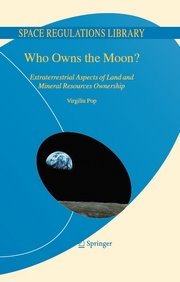 Radio Timisoara's Simona Pele hosts a 35-minute long interview with me on the show "Cap de Afis", where we discuss about the issue of extraterrestrial real estate.
Radio Timisoara's Simona Pele hosts a 35-minute long interview with me on the show "Cap de Afis", where we discuss about the issue of extraterrestrial real estate.
Friday, January 23, 2004
"Cap de afis" with Simona Pele, Radio Timisoara
Monday, January 19, 2004
Is Space Exploration Worth the Cost?
I published this article on spacedaily.com -
The new space policy of the Bush administration, aimed at taking the humankind back to the Moon and on to Mars, came under fire before even being released. In their bid at the Democratic nomination for the White House, several politicians criticized George W. Bush's grand space plans, arguing that the money would find a better use here, on Earth.
"I also want to explore planet Earth and planet D.C.," Dennis Kucinich said. Al Sharpton too suggested that Bush instead try to discover the lower-income parts of Washington. "I mean, it won't cost as much ... and it would be just as enlightening for him".
Joseph Lieberman stated that the money would be needed "right here on Earth to give health care that's affordable to ever! Ybody, to improve our education system, and do better on veterans' benefits and homeland security". And Howard Dean agreed that "space exploration is terrific", but went on to ask – "Where is the tax increase to pay for it? It is not worth bankrupting the country."
Since the beginning of the space era, it has been argued that the money spent on space exploration should rather be used on meeting the needs of the underprivileged. "If our nation can spend … twenty billion dollars to put a man on the moon, it can spend billions of dollars to put God's children on their own two feet right here on earth." – were stating respected figures like Martin Luther King Jr.
People like him were not necessarily opposing space exploration; they were instead disputing the priorities – is space exploration worth pursuing when money is so badly needed elsewhere? Unfortunately, the benefits of the space exploration are not self-evident, no matter how real they are. And people are genuine in their worry that money is being wasted in space. Their concern with spending priorities needs to be addressed.
The high profile of space exploration makes it appear more expensive than it actually is. The uninformed, yet caring citizen, is under the earnest impression that the money would make a genuine difference in the fight against poverty. The real dimensions of the social needs are, in reality, out of proportion with the money spent in space – be it in the past, now or in the immediate future. Otherwise, there won't be any social needs left after the Congress stopped funding the Apollo missions to the Moon.
In the same time, many of the critics of the space programme on social grounds are "limousine liberals". They point the finger at the US government for wasting their tax money in space instead of helping the poor, but they are not feeling guilty for their own consumerist life style and for their own scale of priorities.
For instance, this year, total pet-related sales in the United States are projected to be $31 billion – the double, almost to the cent, of the $15.47 billion NASA budget. An estimated $5 billion worth of holiday season gifts were offered – not to the poor – but to the roving family pets – six times more than NASA spent on its own roving Martian explorers, Spirit and Opportunity, who cost the American taxpayer $820 million both. Instead of providing a launch pad for the immorally expensive shuttles, Florida can do better and clothe the underprivileged - a genuine alligator pet collar cost only $400 a piece.
Are space rockets expensive toys for the big boys? In any case, they cost less than the $20.3 billion a year spent in the US on the human popular toy industry. One doesn't need toys to play with when the most popular game is playing deaf and blind to the needs of the poor – provided one criticizes the waste in space.
Instead of betting on the future, Americans spend $586.5 billion a year on gambling. It is perhaps immoral to criticize one's personal choice, so instead of kicking the habit and feeding the poor with this money, one should stop instead the enormous waste in space who stands at a scandalous amount of 40 times less than gaming tokens.
Speaking about personal choice, $31 billion go annually in the US on tobacco products - twice the NASA budget -, and $58 billion is spent on alcohol consumption -almost four times the NASA budget. Forget space spin-offs – here are genuine tangible benefits: $250 billion are spent annually in the US on the medical treatment of tobacco- and alcohol-related diseases - only sixteen times more than on space exploration.
In the eve of the launch of Apollo 11, a moving event occurred at NASA's moonport. Reverend Ralph Abernathy, president of the Southern Christian Leadership Conference and heir to Martin Luther King Jr., came to Cape Canaveral together with several hundred members of the Poor People's Campaign, to protest the money being spent on space exploration, while so many people remained poor.
He was met by Thomas Paine, the administrator of NASA, who was informed that in the face of such suffering, space flight represented an inhuman priority and funds should be spent instead to feed the hungry, clothe the naked, tend the sick, and house the homeless.
Paine enlightened the good reverend that the advances in space exploration were child's play compared to the tremendously difficult human problems of the society, and told him that "if we could solve the problems of poverty by not pushing the button to launch men to the moon tomorrow, then we would not push that button."
Here are $976.3 billion dollars – almost a trillion - spent every year in the US on pets, toys, gambling, alcohol and tobacco. It is 63 times the amount spent on space exploration – with the difference that NASA has not destroyed lives as the alcohol, tobacco and gambling did. It is not the exploration spirit that Americans need to give up in order to alleviate poverty. It is the consumerist spirit.
Instead of not pushing the button, why not kick the habit?





